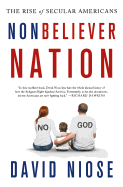Book Review: Nonbeliever Nation by David Niose

In his new book, Nonbeliever Nation: The Rise of Secular Americans David Niose, president of the American Humanist Association, outlines the history of secular thought in America, the relatively recent rise of the Religious Right, and a resulting re-emergence of secular forces that is still in its early stages. He then urges secular people (whom he broadly defines) to step forward and reclaim their longstanding right to be recognized and allowed to participate in the political life of the United States.
For humanists, a lot of this information and history will be familiar ground, and many of the author’s arguments will be familiar as well. But Niose’s book is a clear, well-written, thoughtful summation of the secularist viewpoint, written in an engaging, lively style. This should make it an appealing introduction to humanist/secularist thought for those who are not humanists, and for humanists it provides a wonderful summation of our general viewpoint.
His first several chapters are a quick survey and short history of secularism in America. He points out that secularism is a long cherished American point of view. By secularism he means not just atheism and agnosticism (which he addresses) but also religious people who believe that religion should be their private domain and not be supported or imposed by the government. He outlines the history of secular support, a narrative that may seem obvious to many but has become the subject of attack by the Religious Right in what can only be termed an audacious attempt to rewrite history.
He argues that there was a sea change in the broad support of secularism, first in the 1950’s as a result of opposition to communism, and again in the 1980’s with the rise of the Religious Right. It is a change that has been brought about in large part by the assumption by many that secular values were too entrenched in the American character to really be the subject of such obvious assaults. But by not engaging the Religious Right’s arguments earlier, the Silent Secular Center (my own term) allowed the Right to begin to dominate the political debate, in part by demonizing the very idea of a “secular society” which for so long had been the accepted American ideal.
Niose calls for secular Americans to re-engage in the national debate, to step forward and announce themselves for what they are, and refuse the Religious Right’s attempts to marginalize them. He does so in straight-forward, well-argued writing that is eminently readable. For people who are already humanists, his urgings to come out more publicly about our views is the main challenge of the book.
This book is not aimed primarily at changing minds on these subjects but at raising the alarm to just what is happening in political and cultural America to people who, quite frankly, might not have given the matter much thought. But it is the very public coming-out of the Religious Right in this last presidential election, with serious candidates such as Rick Perry, Michele Bachman, and Herman Cain, that has awakened many people to just what the Right is now trying to impose, and how it goes against the very fabric of America. In that way, David Niose has written one of the timeliest books published in the last few years.
Nonbeliever Nation: The Rise of Secular Americans is now available on Amazon.com.
